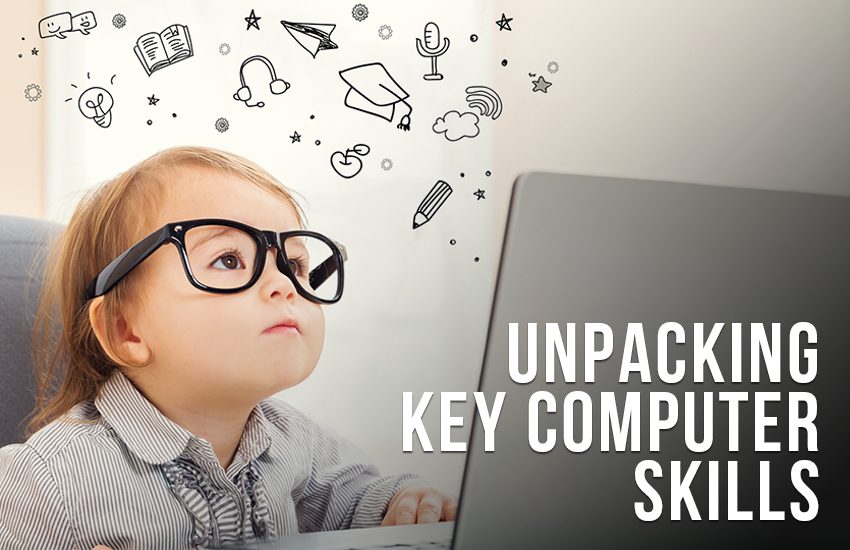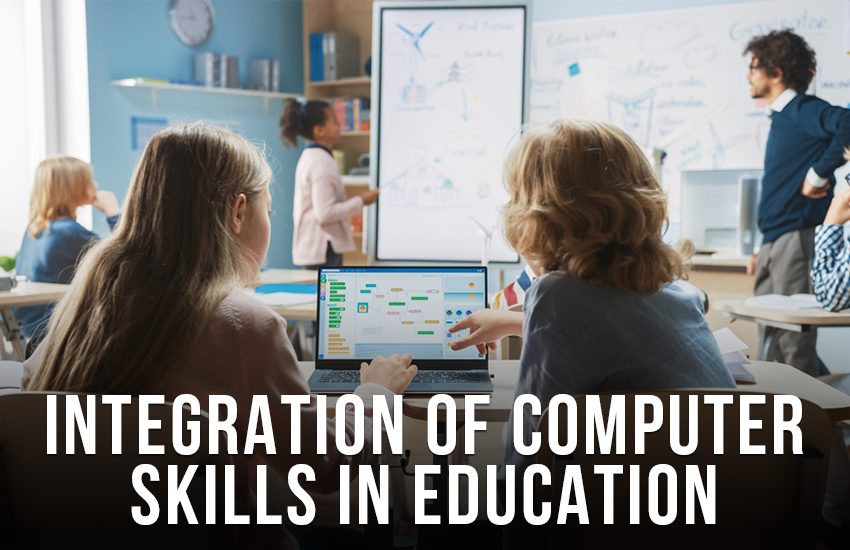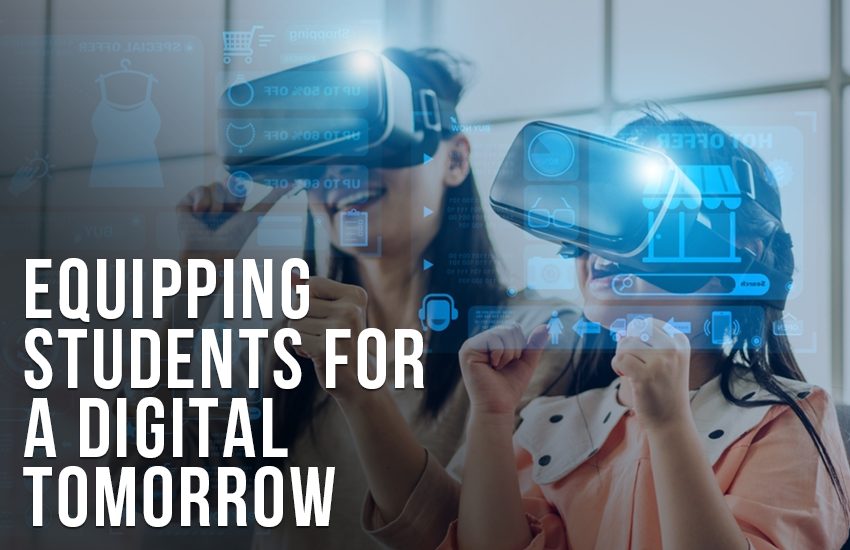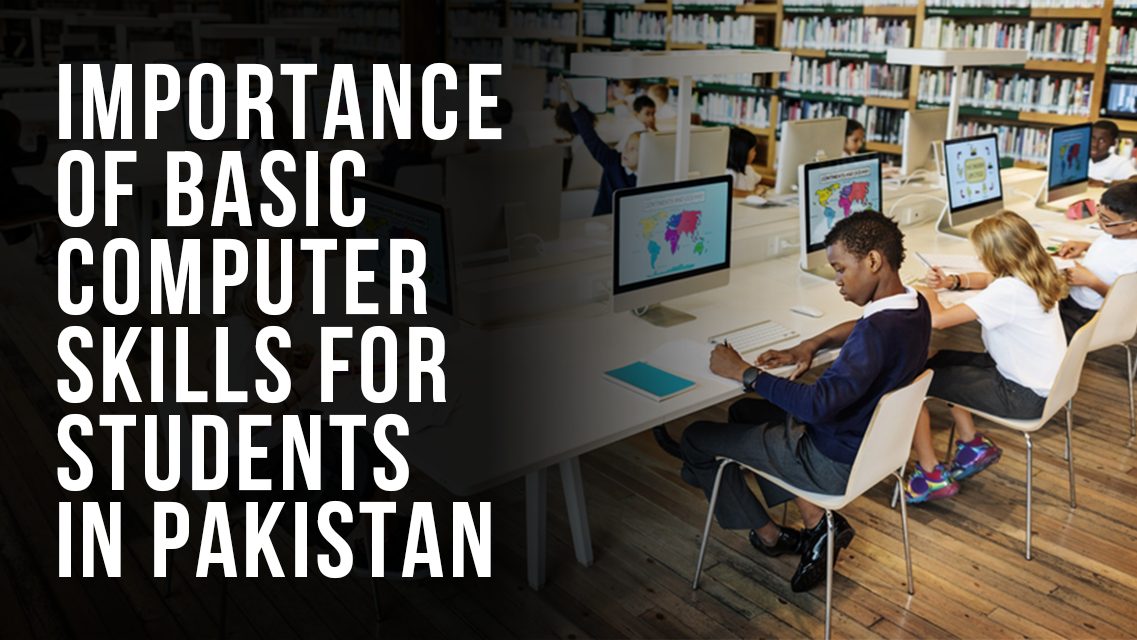Importance of Basic Computer Skills for Students in Pakistan
In the rapidly advancing digital landscape, basic computer skills for students have transitioned from being a mere advantage to an essential tool for success, especially for students in Pakistan. As the world becomes increasingly interconnected through technology, possessing fundamental computer skills has become synonymous with being prepared for the challenges of the 21st century. This blog delves into the significance of imparting basic computer skills to students, shedding light on the importance of basic computer skills and how these skills empower them to navigate the digital realm with confidence and shape a promising future.
Why Basic Computer Skills Are Important

In a world driven by technology, the importance of learning basic computer skills cannot be overstated. Here’s why is it important to learn computer skills for students in Pakistan:
- Digital Literacy: Proficiency in basic computer skills for students equips them with the ability to interact seamlessly with digital devices and platforms. It encompasses various aspects, including understanding how to use digital devices, accessing online resources, and critically evaluating information found on the internet. In an age where information overload is prevalent, digital literacy empowers students to discern credible sources from misinformation. This skill fosters a sense of empowerment, as students gain the tools needed to engage with technology purposefully and make informed decisions in both their academic pursuits and everyday lives.
- Access to Information: Basic computer skills serve as the key to unlocking a treasure trove of information. With the internet at their fingertips, students can explore diverse subjects, access e-books, research articles, and educational platforms. This access empowers them to become independent learners, capable of seeking knowledge far beyond the confines of traditional textbooks.
- Academic Empowerment: Basic computer skills contribute significantly to academic success. With the digitalization of education, students need to be proficient in using various software and online platforms to access resources, complete assignments, and collaborate with peers. These skills streamline the learning process, enabling students to manage their academic responsibilities efficiently. Moreover, as assignments increasingly incorporate digital elements, such as multimedia presentations and online research, possessing these skills becomes crucial for delivering impactful and engaging work that stands out.
- Preparation for The Future: The rapid advancement of technology has transformed the global job landscape. Basic computer skills are no longer optional; they are necessary to thrive in the modern workplace. By imparting these skills to students, we are preparing them for a future where digital fluency is a baseline requirement. Students who are adept at using technology have a competitive edge, as they are better equipped to adapt to new tools and systems in their professional careers. Additionally, as industries continue to evolve and incorporate technology, possessing basic computer skills ensures that students remain adaptable and ready to embrace emerging opportunities.
- Problem-Solving Proficiency: Basic computer skills go hand in hand with problem-solving abilities. As students navigate various software interfaces and applications, they encounter challenges that require logical thinking and innovative solutions. The experience of troubleshooting technical issues cultivates resilience and adaptability, qualities that are essential for success in the modern world.
Unpacking Key Computer Skills

In our modern interconnected world, having fundamental computer skills isn’t just beneficial; it’s essential. Now, let’s dig into the reasons behind the immense importance of these skills:
- Keyboard Proficiency: Learning to type efficiently not only speeds up tasks but also enhances communication and productivity. Students who master keyboard skills are better equipped to express their ideas clearly and navigate digital environments effortlessly. Whether it’s composing essays, emails, or engaging in online discussions, keyboard proficiency enables students to focus on the content rather than struggling with typing.
- Internet Exploration: Internet exploration is a crucial computer skill for students and it involves effectively searching for information, evaluating sources for credibility, and discerning relevant content. In an era where information is at our fingertips, students who can navigate search engines, access reputable resources, and verify information contribute to their own intellectual growth and critical thinking abilities.
- Word Processing: Word processing is an important computer skill for students and it involves using software to create, edit, and format text documents. Whether it’s writing essays, reports, or assignments, mastering word processing tools enhances the presentation and professionalism of written work. Students proficient in word processing can effortlessly organize content, add graphics, and employ formatting features to create polished documents that leave a lasting impression.
- Basic Coding Concepts: Understanding basic coding concepts introduces students to the language of technology. It’s not about turning every student into a programmer but rather fostering computing fundamentals and computational thinking. Learning coding basics instills problem-solving skills, logical reasoning, and the ability to break down complex challenges into manageable steps. This skill nurtures creativity as students see firsthand how their ideas can come to life through code.
- Data Management: In an era driven by data, the ability to manage and analyze information is invaluable. Basic data management skills teach students how to organize, store, and interpret data effectively. Whether it’s keeping track of personal information, creating simple databases, or utilizing spreadsheet software, these skills prepare students for a world where data-driven decision-making is becoming the norm.
Benefits of Basic Computer Skills for Students

In our digitally connected world, possessing fundamental computer skills is more than an advantage; it’s a must. Now, let’s explore the benefits of basic computer skills for students:
- Enhanced Communication: Basic computer skills have transformed the way students communicate. Through platforms like emails, social media, and video conferencing, students can interact with peers, teachers, and experts worldwide. These skills enable clear and efficient communication, fostering collaboration and the exchange of ideas regardless of geographical boundaries.
- Access to Information: The internet has become a treasure trove of information, and basic computer skills act as the key to unlock it. Students can conduct online research, access digital libraries, and explore educational websites to deepen their understanding of subjects. This access to diverse information empowers students to pursue self-directed learning and gather insights from various perspectives.
- Digital Citizenship: In an increasingly digital world, being a responsible digital citizen is crucial. Basic computer skills include understanding the ethical and safe use of technology. Students learn about cyberbullying prevention, online privacy, and the importance of citing sources accurately. These skills equip them to navigate the digital landscape with integrity and respect.
- Problem Solving: Computer skills aren’t just about clicking buttons; they involve problem-solving prowess. Students learn to troubleshoot technical issues, navigate software interfaces, and adapt to new tools. These problem-solving abilities extend beyond computers, enhancing their critical thinking and adaptability in various real-world scenarios.
- Creativity and Innovation: The digital realm is a canvas for creativity, and basic computer skills offer students a palette of possibilities. They can create digital artwork, design websites, or produce multimedia projects. These skills encourage students to think innovatively, experiment with various tools, and transform their ideas into tangible digital creations.
Integration of Computer Skills in Education

Embracing technology in education is no longer an option but a necessity. The seamless integration of computer skills into the curriculum equips students with the tools they need to thrive in our digital age. Let’s explore how basic computer skills are integrated into the education system in Pakistan:
- Curriculum Integration: Integrating basic computer skills into the curriculum enhances students’ readiness for a digital world. By blending coding, digital literacy, and software proficiency into subjects like mathematics, science, and language arts, educators create an environment where students can grasp complex concepts while acquiring practical tech skills.
- Extracurricular Activities: Extracurricular activities provide a dynamic canvas for students to explore and deepen their computer skills. From robotics clubs to coding bootcamps, these activities not only nurture technical talents but also foster collaboration, problem-solving, and adaptability – the skills that go beyond the classroom.
- Project-Based Learning: Project-based learning, enriched with computer skills, cultivates a sense of ownership and achievement among students. By embarking on digital projects that span multimedia presentations, app development, and coding challenges, students learn to tackle real-world problems creatively and present their solutions effectively.
- Online Learning Platforms: Online platforms offer an expansive realm for students to develop computer skills at their own pace. Through interactive coding courses, video tutorials, and virtual workshops, students can explore coding languages, graphic design, and programming fundamentals, equipping them with tools that align with their interests.
- Future Skill Alignment: Aligning basic computer skills with future workforce demands empowers students with a forward-focused advantage. As industries continue to evolve, proficiency in computer skills prepares students for roles across sectors – from technology-driven positions to analytical roles – thus widening their horizons for potential career pathways.
Equipping Students for a Digital Tomorrow

Within the complexity of modern education, basic computer skills are threads that connect students to opportunities and success. These skills are not just tools; they are catalysts for academic growth and future achievements. By empowering students with fundamental computer skills, we provide them with a passport to the digital future. With these skills, they can engage with technology confidently, contribute meaningfully to a tech-driven society, and build a brighter tomorrow for themselves and their nation.
From basic computer literacy to coding proficiency, students armed with these skills possess a tangible advantage in our technology-driven world. They’ll unravel the mysteries of algorithms, breathe life into code, and find ingenious solutions to complex problems. This empowerment is not only a gift for their educational journey but also an investment in their future career prospects.



